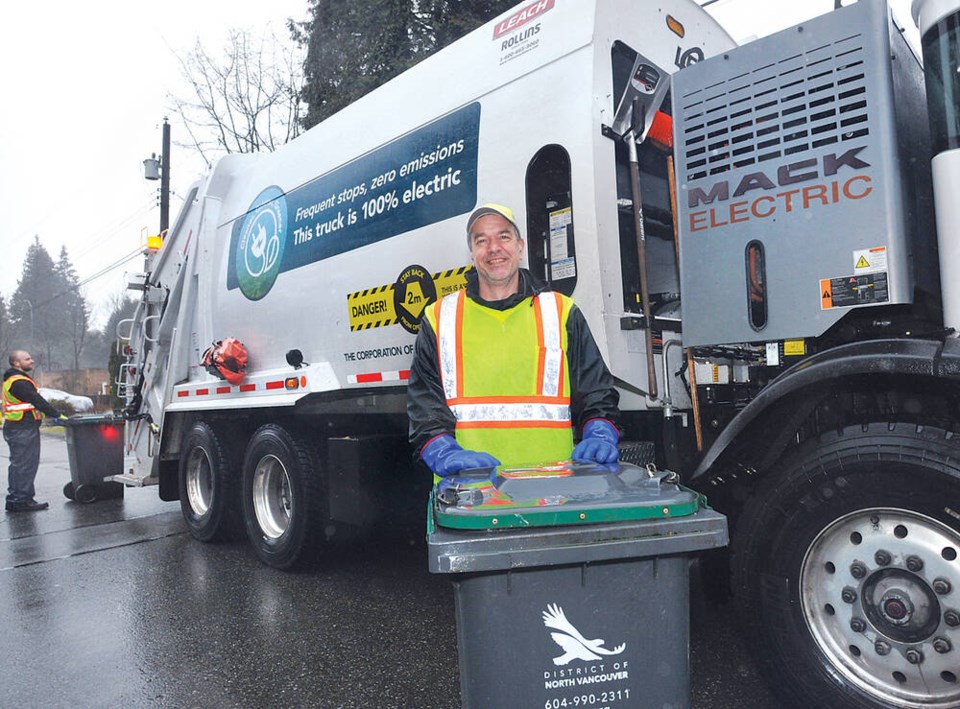Chances are, you’ll smell it coming before you hear it.
The District of North Vancouver is testing out an all-electric, rear-loading garbage truck, the first of its kind in B.C. For the last three months, the Mack Electric has been making the rounds of the district’s hills and lanes to find out if electrification of the district’s fleet is viable in the near future.
Currently, about 80 per cent of the fuel the district purchases and burns today runs through its fleet of garbage trucks, said Michael Toland, DNV’s section manager for fleet and solid waste, but there is direction from council to draw down emissions wherever possible.
“If we can get an alternative fuel source for them, it’s really going to drop our fleet GHGs,” Toland said. “We’ll run it through with normal operational duties. We’ll check if it works and everything’s good, then what we’ll do is we’ll go out and buy that product.”
The electric garbage trucks cost about $1 million each, but with federal and provincial grants to incentivize decarbonization, the out-the-door cost falls to about $700,000 – still about $100,000 more than a standard diesel model.
“But we make massive savings on the fuel,” Toland said, noting that cost of running a diesel truck dwarfs the EV’s charging cost by a ratio of about six to one.
Staff are still working out what the final reduction in carbon emissions would look like, but “my expectation would be it would be significant,” Toland said.
Can EVs be used for garbage collection?
Regardless of how financials and GHG reductions pencil out, converting to electric won’t make sense if the trucks aren’t capable of handling the duty cycle – picking up about 1,000 carts per day, carrying 10 or more tonnes of garbage and organics to the North Shore Recycling and Waste Centre in Maplewood, and having enough battery power left to make it back to the district works yard on Crown Street to charge overnight.
“Early learnings are that it will [be able to do the job] at this point in time. It’s performed almost identical to a diesel truck,” Toland said.
One of the most critical periods in the test though has been playing out over the recent cold snap. For much of the first few months of the pilot, the daytime temperature has been around 10 C. Crews are now making detailed logs on how the cold is impacting the battery life and range for the truck as temperatures dip below freezing.
“Because it’s obviously not like a diesel truck. We cannot bring out a gallon of electricity, like we can a gallon of diesel if it ran out,” Toland said.
District foreman Andrew Merilees, who has been with the district for almost 20 years, said he expects there will be days when the electric truck has to call it quits early and go recharge.
“I think that’s a really, really good thing that we’re going to experience that, because that’s what we want – to push it to failure, right? Because, otherwise, the test is useless,” he said.
EVs mean quieter streets
The Mack Electric doesn’t have the instant torque that smaller EVs, like the one Merilees drives when he’s off work, are famous for. But it does share some of the other benefits – particularly the noise they make – or don’t make.
The hydraulics used to lift the carts and compact waste are every bit as loud as a regular truck’s lifts, but getting from bin to bin is whisper quiet.
“I don’t even know how to describe it,” Merilees said. “It’s like a hallelujah breakdown with the noise.”
The stealthy arrival of the EV means residents can no longer wait until they hear a truck rumbling up their block to rush their cart to the curb.
“The initial [reaction] is one of disbelief. They see us coming, and then they get that quizzical look,” Merilees said. “They love it. So far, every single interaction has been positive.”
Sometime in late spring or early fall, the district will decide whether to purchase the Mack Electric they are testing now along with others to join fleet.
“The expectation would be we may end up with half of our fleet electric and half of it diesel. That’s just within our normal replacement program,” Toland said.
 Want to stay updated on North Vancouver and West Vancouver news? Sign up for our free daily newsletter.
Want to stay updated on North Vancouver and West Vancouver news? Sign up for our free daily newsletter.



